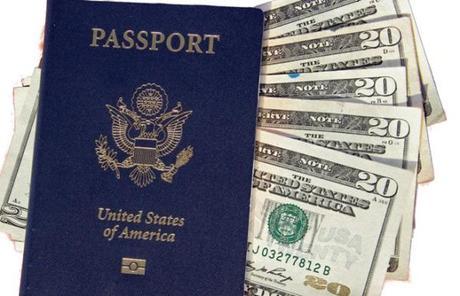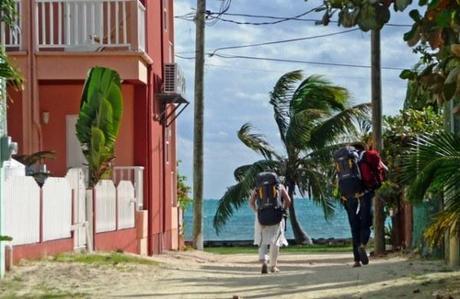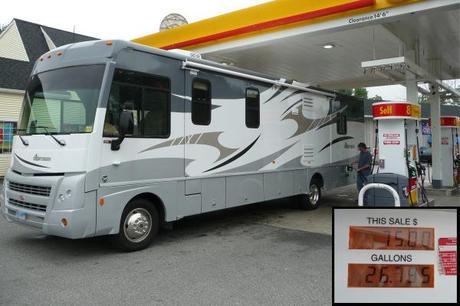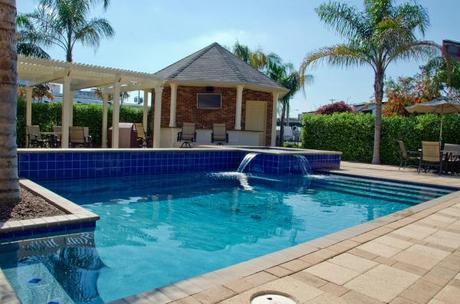
Wannabe wanderers initially have just one question on their minds: How much does long-term travel cost? The classic response to this question may be informative, but is not completely helpful.
The web abounds with the personal budgets of folks who have taken off to explore the world. Through the magic of Google it is easy to find detailed financial histories for backpackers and RVers chronicling weeks, months and even years of their spending. These individual budgets are often posted as definitive answers to the headline question. What they miss, though, is the most important cost component of all: you!
One thing we’ve learned after more than two years on the road is that no matter where we go we never leave ourselves behind. We take with us our preferences for food and for comfort, our likes and our dislikes, our needs and our wants, our hobbies and our interests. These preferences and obligations are unique to us. Nobody else’s travel style is exactly like ours. Nobody else’s lives are quite like ours. So nobody else’s travel budget fits us just right either.
What makes matters worse is that the budgets you most often see online do not reflect the full range of traveling styles. Instead, they almost exclusively fit into the very narrow category of extreme budget travel. It’s this way for a reason. People are more willing to share their personal financial details when it highlights a perceived virtue, like frugalness. Another motivation for posting barebones budgets is to show how inexpensively some people can travel.
A recent post at the budget travel site Nomadic Matt illustrates the downside of this approach. In The Myth Travel is Expensive Matt wanted to see how far he could stretch $100 in the costly city of Stockholm. His answer: an impressive 5 days. More important, though, is the context Matt adds to what that level of spending meant for his travels.
“Living like a pauper was boring. Incredibly boring. Sure, I did some stuff, but not nearly as much as I would have liked. It was hard to go out with friends because even buying a soda could bust my budget. See that movie? Nope. Eat out? Definitely not. Filling the days was easy – I walked around a lot, took the free walking tours, hung out in parks, did a lot of wandering, or worked. I was never bored during the day. But the nights? The nights were agony.”
And while the intended point of Matt’s article is that you can travel really inexpensively if you want, the larger truth – one that budget travelers almost never mention – is that you may not actually want to. Some travelers may enjoy just sitting on park benches in Stockholm all day. And that is great for them. Others may feel that it’s a complete waste of time to travel somewhere and be so limited in what you can do.
Moreover, extreme budget travel often means enduring other hardships too, like sleeping on the couches of strangers or in dormitory accommodations; possibly walking or hitchhiking between locations. For RVers, forgoing the cost of utility hookups means constant water and electricity rationing. While the hardcore traveler may see these as worthwhile sacrifices for a life on the road, they aren’t for everyone.

The question isn’t just “Can you live like a backpacker?” but “Do you want to?”
So when asking “how much does it cost?” forget everyone else’s spending for a moment and start with the only budget that matters: your own. Your existing budget includes a wealth of the personal details you’ll never find online. By looking at your current spending habits you can easily see how much you like to dine out, how much you spend on hobbies, on entertainment, and on unavoidable fixed costs. Each line item in your budget is a window into your preferences and obligations. It is the single best source of information when trying to forecast how much fulltime travel will cost you.
Building your travel budget off of your existing spending habits requires that you actually track your existing spending. You do that, don’t you? If not, it is high time to get started.
The good news is that today’s technology makes tracking spending super easy. Gone are the tedious days of writing down each purchase. Now it’s just a matter of using a credit or debit card for every purchase and downloading all the transactions into personal finance software like Quicken. If you already use plastic most of the time, you probably have a year’s worth of spending details waiting for download.
Building a Fulltime RVing Budget
Now that you have a good handle on where your money goes, forecasting your cost of living in an RV is a fairly straight forward exercise. What you’ll find is that many categories of expenses won’t change dramatically and most of the rest are fairly easy to estimate. Building your personal fulltime travel budget is a simple matter of adjusting your existing spending for known changes.
Monthly spending on things like groceries, entertainment, alcohol, cell phone service, satellite T.V., dining out, health care, insurance and a host of other items may stay exactly the same. What you spent during the last twelve months is a pretty good guide to what you’ll spend in the coming twelve months – whether at home or in an RV.
Other spending categories will change in predictable ways. You’ll replace your rent or mortgage payments with campground fees. Your electricity budget will likely drop to zero but you’ll have new spending on propane. Home and yard maintenance costs will be a thing of the past but you’ll likely spend more, perhaps a lot more, on gasoline.

Forecasting these new expense categories isn’t hard but requires you to think about how you want to travel. How much you spend on campground fees depends on how you plan to camp. Primitive camping without water and electric hookups is often free. Free camping with hookups is available to people willing to work at the campground (called Workamping).
Private campgrounds with amenities like full hookups, swimming pools, cable T.V., and wifi vary in cost from a low of about $20 per night to more than $100. We’ve found a nightly rate of between $30 and $35 to be about average for private campgrounds, with an occasional high priced location offset by more frequent lower cost ones.
Discounts for weekly and monthly stays can cut those prices considerably. It’s not unusual to see monthly discounts of as much as 70% off of the nightly rate. So there are real savings to be had by hanging out in one spot. While our idea of travel doesn’t include spending months at a time in the same location, plenty of other folks do. But that is the entire point – your budget will reflect your travel style, not ours.
By just looking at the range of campground costs travelers encounter it is easy to see the huge diversity of potential budgets. Workampers and boondockers may spend nothing on this category. More stationary travelers taking full advantage of discounts may spend $300 to $400 per month at private campgrounds whereas constant travelers who enjoy the conveniences of shore utilities may spend $1,000 or more each month. That’s potentially a $12,000 annual swing in just one category of spending.

Swank campground amenities are available, for a price.
The same is true for gasoline. How much you spend here not only depends on how far you drive but also on the kind of “rig” you have. Only you know the fuel efficiency of your setup or can estimate how many miles you want to drive each month. With just a little forethought it isn’t too hard to make a reasonably accurate estimate of your specific monthly gasoline expenses (miles driven / MPG * average gasoline price = fuel cost).
You’ll be able to make similar estimates about most of your spending categories, too. Some items, like propane expenses, may be a little harder to estimate because you may not have a good handle on how much propane you’ll burn. For items like this, it’s okay to plug in a guesstimate based on other peoples’ budgets. These numbers are small enough not to have a huge impact and whatever you use is likely to be a better estimate than leaving the category blank.
Building a world travel budget
Estimating expenses for world travel is harder than for domestic RVing because more of your existing budget will change and because living costs are so variable from place to place. How much you spend on a worldwide trip not only depends on your spending preferences but where you travel.
Nevertheless, we still suggest starting with an examination of your existing spending habits, if for no other reason than to get a handle on your fixed expenses. Are you planning on keeping a residence in your home country? Maintaining health insurance? What about income taxes? All of these expenses, and possibly more, may continue regardless of where you are in the world. Travel expenses will come on top of these fixed costs.
Looking at your current spending also gives you an objective sense of how frugal you really live. If you’re currently spending thousands of dollars per month on discretionary entertainment items you may want to think twice before committing to a frugal travel budget.
Once you have a feeling for your fixed costs and discretionary spending habits, it’s time to consult other references to roughly ballpark your budget.
Cost of living calculators: A good way to gauge the expense of a given destination is to compare what locals pay for things against what you’re used to spending. Cost of living calculators like Numbeo.com give local price information for everything from a taxi ride to a meal out. With this information it is possible to adjust each line of your current budget to reflect what you would have spent if you lived in that foreign destination. With these price adjustments, you can build a detailed world travel budget in the same way you’d build a domestic RVing budget.
Guide Books: Many guide books give a per-day estimate for the countries they cover. We found Lonely Planet’s cost information to be a pretty good indicator for what we spent using local transportation and budget accommodations. Fromers and Foders offer similar information for more mid-range, vacation type, excursions.
RTW cost calculators: Sites like RTW Price Tag allow you to cost out a global mult-destination trip. Like most online resources the site has a budget travel bias, so adjust the estimates accordingly.
Other travelers: Notwithstanding all the caveats above about how other travelers’ budgets may not fit your needs, when taken with a grain of salt, they can be a good resource for determining what is possible. Good round-ups of several travel budgets are found at Legal Nomads Long Term-Travel Resource Page and BootsNAll’s Travel Budgets Revealed
Long-term travel costs as much as you have
For all the words spilled here and elsewhere about the cost of travel the real answer to the question “How much does it cost?” is “As much as you have.” While that may sound flip and unhelpful, it is probably the most accurate answer you’ll ever hear. Each of us tends to spend the resources we have and adjust our lifestyles to match. Travel is no different. If we can afford to do something other than spend our days sitting on a park bench or walking between towns, most of us will choose to do that. If we can’t, we won’t. Our travel budgets will reflect our monetary constraints as much as anything else.
We’d caution folks against assuming radical changes in spending and lifestyle. It’s easy when caught up in the fever of planning a life on the road to pretend you’ll be comfortable living a more frugal lifestyle then you currently do. Saying you’ll cut spending in the future is an easy way to make the numbers work. But if it is really that easy, why haven’t you cut that spending already?
Our advice is to live your travel budget while you’re still in the planning stages. If you plan to save money by living without cable T.V. or by cooking rudimentary meals in hostel kitchens, make those changes now. Not only will this accelerate your savings, but will also give you insight into the lifestyle you’re contemplating. Better to find out now if those changes are acceptable than after you’ve quit your day job.

